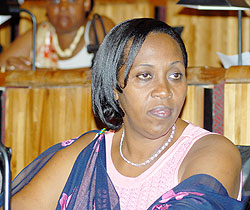MPs led by Liberata Kayitesi, the chairperson of the Rwanda Network of Parliamentarians for Population and Development (RPRPD) have welcomed reports that scientists are on the verge of a breakthrough in the development of a male birth control pill; a new contraceptive alternative to condoms. International media reports claim that male contraceptives in human trials appear to work generally by reducing sperm output to the point of infertility.


MPs led by Liberata Kayitesi, the chairperson of the Rwanda Network of Parliamentarians for Population and Development (RPRPD) have welcomed reports that scientists are on the verge of a breakthrough in the development of a male birth control pill; a new contraceptive alternative to condoms.
International media reports claim that male contraceptives in human trials appear to work generally by reducing sperm output to the point of infertility.
In an interview, Kayitesi said: "Current birth control methods for men are only two; men have to use condoms or vasectomy. These are not enough–only women had variety of methods to use and thus if we were lucky and this succeeds, it will be very welcome because family planning is the responsibility of the two principles of the family.”
Kayitesi noted that if the scientists succeed, efforts will be made to sensitise and encourage Rwandan men to use the pill.
"I think Rwandan men will understand its importance because they have now understood that family planning is their responsibility too.”
According to reports, the male birth control pill works in a similar fashion to female birth control. It allegedly lowers the sperm count to a level not conducive for conception.
However, despite 95 percent of the men who used the pill showing successful results, it is not yet considered as safe or effective for everyone, particularly due to the side effects and negative reactants, like alcohol.
The Bill and Melinda Gates Foundation will host a conference in October to showcase current research for possible male birth control pills, according to the media.
Parliament in June called for the country’s population dilemma to be given more focus, through better hands-on strategies.
Rwanda's population is currently estimated at over 11 million, and growing.
Ends


